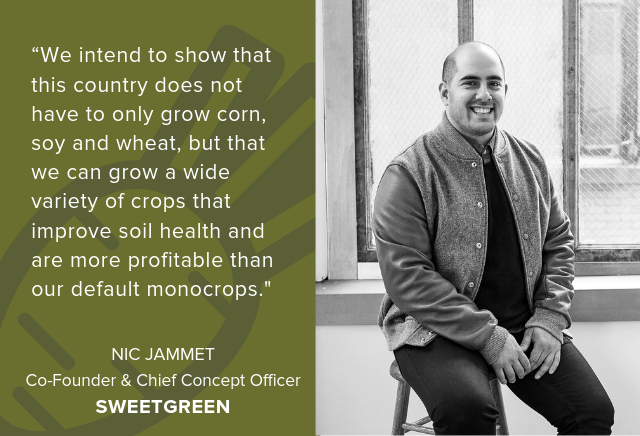
Food+Tech Connect and The Future Market are hosting Biodiversity: The Intersection of Taste & Sustainability, an editorial series featuring interviews with over 45 leading food industry CEOs, executives, farmers, investors and researchers on the role of biodiversity in the food industry. Read all of the interviews here.
Sweetgreen made a big splash last year when it put the Koginut Squash, a new squash bred for flavor by Row 7 Seed Company, on its menu. The Koginut Squash Bowl received considerable social media influencer attention and mainstream press (like Vogue, Fast Company and The Washington Post). It even landed a Times Square Billboard. Rather than leading with the sustainability benefits, the campaign to make this new vegetable a pop culture sensation centered on flavor. As we think about how to broaden the pool of people who care about the sustainability of their food, this collaboration serves as a great example of how to make heady stuff stuff like biodiversity and sexy.
Below, I speak with sweetgreen co-founder and chief concept officer Nic Jammet talks about how sweetgreen thinks about biodiversity and encourages it across its supply chain.
__________________________
Danielle Gould: Is biodiversity a priority for your sweetgreen? If so, how and why?
Nic Jammet: At the farm level, biodiversity is a priority for us when we approach sourcing local produce. At a larger scale, we look to maintain a wide variety of agro-ecosystems by incorporating a diversity of animal based and non-animal based proteins on our plant-forward menu.
This past September, we made biodiversity a priority by introducing Koginut Squash to the menu. This new seed bred for flavor in partnership with Row 7 Seed Company has the potential to change what we eat and where it comes from a scale never before seen.
Row 7 and sweetgreen’s nationwide collaboration supports a shared commitment to delicious, sustainable and nutritious food from the ground up. Part of sweetgreen’s food ethos has always been finding ways to source smarter, make better decisions and help customers be a positive force in the world and on the food system.
Sweetgreen works with our 100+ local farmers, several of whom planted and harvested 23 acres of Koginut Squash (equal to 100,000 seeds) across the country, making them the first mass scale partner to work with Row 7 in its mission to make better seeds and ingredients more accessible to all.
DG: How does sweetgreen define and think about biodiversity? Why?
NJ: At the farm level, we define biodiversity as a farm that harvests 5 or more different crop varieties. We also evaluate the following aspects of a farm:
-
Crop rotation
-
Integrated Pest Management practices
-
Plants polinator abitats
-
Green manure application/compost
-
Biodynamic certifications
-
Soil management planning
-
Cover cropping
DG: What is sweetgreen doing to promote biodiversity?
NJ: We support growers who practice biodiversity, and we also discuss what is important to us (above) with those growers who do not practice it currently. It factors into our purchasing decisions.
Transparency of where food is coming from and how it is grown sustainably is one of the best ways to support biodiverse growers who are trying to make a positive, lasting impact on the food system. We need to give credit back to them, create long-term sourcing relationships, and expand the marketplace so that consumers understand that their dollar can have significant impact every time they buy food (which is often!).
DG: What are the greatest challenges and opportunities sweetgreen faces for creating a more biodiverse agricultural system?
SG: A big challenge is the lack of support for small to medium sized growers who are trying to support biodiversity quite simply because it is the right thing to do. The marketplace is set up to support cheap food versus supporting growers utilizing practices such as biodiversity.
DG: What is your vision for what a more biodiverse food system looks like in 10-15 years?
NJ: In 10-15 years, we intend to show that this country does not have to only grow corn, soy and wheat, but we can grow a wide variety of crops that improve soil health and are more profitable than the monocrops that we’ve defaulted to. A great example is the movement in Montana growing legumes. They’re converting conventional wheat growers and having them grow organic chickpeas and lentils. Those crops are more profitable and the demand continues to grow.
_______________________
 Nicolas Jammet, Co-Founder & Chief Concept Officer of sweetgreen
Nicolas Jammet, Co-Founder & Chief Concept Officer of sweetgreen
Nic Jammet is Co-Founder & Chief Concept Officer of sweetgreen, the destination for simple, seasonal, healthy food. Nicolas graduated from Georgetown University’s McDonough School of Business, where he met fellow sweetgreen co-founders and co-CEOs, Nathaniel Ru and Jonathan Neman. In 2015, First Lady Michelle Obama selected Nicolas for the Presidential Delegation to EXPO 2015, an international summit to discuss global nutrition and health as well as sustainable food solutions. He has been recognized as a key innovator in food and business, named to Fast Company’s “Most Creative People in Business,” Inc.’s “30 Under 30”, Forbes’ “30 Under 30” and Food & Wine’s “40 Big Food Thinkers 40 and Under”. In 2016, sweetgreen was named one of Fast Company’s “Most Innovative Companies.”





